According to the Ieral of the Mediterranean Foundation, to get budget execution back on track, a 27% cut in spending would have to be made for the remainder of the year.
The fiscal cost of the measures announced in the last month by the Ministry of Economy, in a context of electoral campaign, could generate a deviation of 1.3 points percentages of GDP with respect to the deficit goal agreed with the International Monetary Fund (IMF), as estimated by the Economic Research Institute for the Argentine and Latin American Reality (IERAL).
The content you want to access is exclusive to subscribers.
The entity directed by Carlos Melconian, the economic reference for Together for Change, warns in its latest Situation Report that ““The measures announced within the framework of the ‘Program to Strengthen Economic Activity and Income’ widen the deficit and the non-compliance gap.” in relation to the usual behavior of spending and income. The report recalls that in August the accounts were almost balanced and that normally, until the eighth month, 60% of the expenditure and 58% of the income for the entire year are executed. If this pace of execution had been maintained, the deviation from the goal with the Fund would be only 0.4 points. But in 2023 that sequence was altered.


“Among the most notable initiatives is the payment of a bonus for informal workers, the increase in the non-taxable minimum of Income Tax to $1,770,000 for employees and the refund of implicit VAT for a group of around 22.5 million of people,” the study details.
In this sense, IERAL indicates that “the fiscal cost total of these measures for the remainder of 2023 would be between 0.69% and 1.12% of GDP, with an intermediate of 0.9%.”
“If total revenues were as estimated and the fiscal cost of the measures were at an intermediate level, then annual primary spending would rise to 16.9% of GDP, and The primary deficit would amount to 3.2% of GDP (1.3 pp above the IMF goal),” the entity estimates.
In this context, he raises the hypothesis that the economic authorities are trying to get the numbers back on track after the elections. “If after the announced measures the goal with the IMF is to be met, other primary expenses would have to fall by 15.6% of GDP, which would imply an adjustment in real terms in the rest of the expenses of 27% compared to the September-period. December 2022, and an adjustment in average monthly spending of 23% versus the monthly average for January – August 2023.”
While, for the Congressional Budget Office (CPO) in September the fiscal deterioration would have worsened. The accrued deficit of the National Public Administration rose 758.6% in nominal terms, more than tripling the 138.8% inflation that occurred in the twelve months that have elapsed. The OPC report was released prior to the one that will be released on Friday, October 20, by the Ministry of Finance. The numbers may present differences for methodological reasons, since the former take the expenditure accrued from the National Administration and the Economy figures take the expenditure incurred from the Non-Financial Public Sector.. However, it can anticipate a trend. Last month, for the OPC, current spending rose to $3.3 billion, against income of $2.7 billion.
Source: Ambito



